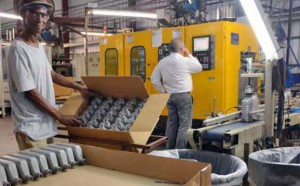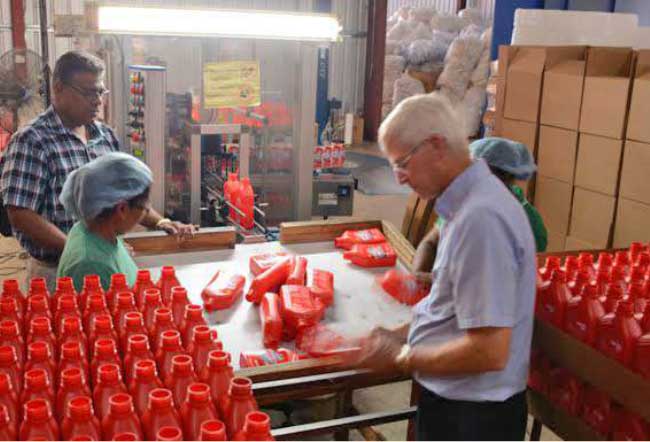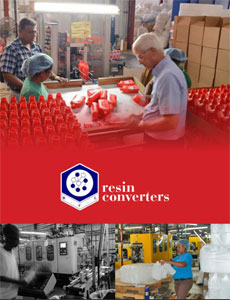A man on a mission to save the environment.
Christian Quesnel is a man with a very interesting problem – as well as a fierce desire to solve it. Quesnel is the Founder and Managing Director of Resin Converters Limited, a Trinidad-based company that is a world-class manufacturer of plastic packaging products for the chemical, food, personal care, and pharmaceutical industries. Quesnel created Resin Converters in 2000. Today, it is the largest contract manufacturer of HDPE plastic bottles in Trinidad. The company’s 85 employees produce a diverse range of plastic jars, bottles, and other plastic products for large local and international corporations.
 Quesnel’s predicament is not that his business isn’t doing well. His quandary is that the very products that his company manufactures are the same ones that are responsible for harming the environment he so dearly loves. “I’m a boating person,” he explains. “I like the sea and I didn’t like what was happening in our environment and our waterways because of the plastics in the environment. I wanted to learn more about the plastics industry and why they couldn’t be re-used.”
Quesnel’s predicament is not that his business isn’t doing well. His quandary is that the very products that his company manufactures are the same ones that are responsible for harming the environment he so dearly loves. “I’m a boating person,” he explains. “I like the sea and I didn’t like what was happening in our environment and our waterways because of the plastics in the environment. I wanted to learn more about the plastics industry and why they couldn’t be re-used.”
At first, Quesnel attempted to either buy into, or buy out, a company that was already in the rigid plastic packaging industry. When that effort proved unsuccessful, he started his own operation. He knew something about plastic bottle manufacturing because of his previous job with a chlorine manufacturing company that used plastic bottles as packaging for its bleach. “The master plan,” he says, “was to become the best in the field, to produce quality products in a cost-effective manner, and at the same time, learn more about the plastics industry to be able to get involved in plastics recycling.”
And that is the gist of Quesnel’s dilemma. At the same time that Resin Converters is providing technologically-advanced plastic packaging solutions, and is one of the largest plastic container manufacturers of blow molded HDPE (high-density polyethylene) products on the island, its owner’s “hidden agenda” is trying to figure out how to address the reduction of high proportions of virgin resin in new bottle production, while increasing the use of recycled waste material.
The conundrum is daunting. Quesnel explains: “Recycling, bottle to bottle (B2B) is very, very costly – and it cannot replace 100 percent of the bottles that are made. You can only use a certain percentage of recycled material. Even if someone became a perfect recycler, and made the resin that can be used again, there is always virgin material that needs to be added to it.” In addition, under United States’ FDA (Food and Drug Administration) standards, which all companies must be guided by, it is impermissible, under present regulations, for Resin Converters to add post-consumer recycled materials in the production of packaging that goes back into the food industry. “We don’t have the mechanism for cleaning the material, at this point,” he laments. And so far, his company has been limited to using up to a 35 percent recycling ratio for products it sells to the chemical industry.
Quesnel is the first one to accept the strange ambiguity of his situation and that the solutions will not come overnight. “It takes time,” he admits. “You have to get the financing to buy the machinery and a sufficient guarantee of available feedstock waste to meet financial viability considerations.” And yet he remains hopeful. “But these problems are going to be solved in the not-too-distant future,” he believes. “There are many people working on this problem, world-wide. There are technologies in the U.S. that successfully takes comingled plastics and make boards and pallets out of them. That industry has been around for a while in the U.S.” Quesnel points to a company called JET Recycling America, Inc. a Nevada-based business that uses a proprietary technology to transform virtually all forms and grades of plastic waste, comingled and regardless of contamination, directly into valuable, 100 percent recycled products.
According to Quesnel, even though Trinidad is a small country, between 50 and 60 million plastic bottles are disposed of into the waste system, every month. He believes that a big part of the problem is that his fellow citizens are not well-educated about the need and benefits of recycling. “We do not have the proper educational material out in the schools and in the general media,” he says. “But I’m going to continue trying to get good sense to prevail; to get my country to accept that recycling is necessary – not only of plastics, but of all the other recycle-friendly materials. We have to treat waste as a potential income and not just taking it to the dump and waste disposal areas, loading more dirt on top of it and thinking it will go away. It’s not going to go away. We have to deal with it.”
So Quesnel will continue to persevere on his two parallel agendas. His company has plans to expand its product line into other areas, in order to grow its client base, which, in turn, will generate more revenue that can be channeled to the recycling side of his business. “I’m a stubborn man,” he declares. “I don’t like to give up and I will not give up. Plastic is one of the most fabulous materials that man has developed. It’s a great packaging product. But with it comes some responsibility. We can’t just use it once and dispose of it; it has to be able to be re-used or converted. I have a desire to get this right.”
Chris Quesnel is a man on a mission to help save the environment. And fulfilling that mission will not only be personally rewarding, it will potentially benefit all of the people who inhabit Trinidad and Tobago – and perhaps all the rest of the world, as well.
________________
AT A GLANCE
WHO: Resin Converters Limited WHAT: Manufacturer of plastic packaging products for the chemical, food, personal care and pharmaceutical industries. WHERE: Caroni, Trinidad WEBSITE: www.resinconverterstt.com



 This information will never be shared to third parties
This information will never be shared to third parties